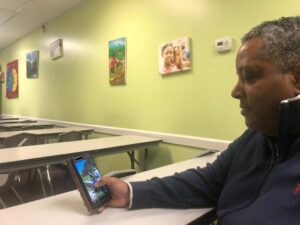13:00
News Story
For many Kansas City refugees, job options depend on spotty public transportation
Advocates say that for every five employers who contact agencies with job openings, only one is accessible by public transportation
This story was originally published by The Kansas City Beacon.
As a young man in the Democratic Republic of Congo, Solomon Kasongo attended university and had plans to launch a meaningful career, possibly in business. War disrupted those hopes. Kasongo fled his home country and spent more than a decade in a refugee camp in Zambia.
When he arrived in Kansas City, Missouri, in 2014, he had not been in a classroom for at least 14 years. But he hadn’t been idle, either. At the camp, he started a microloan campaign to help other refugees start small businesses and make ends meet.
Now that he was resettled in the U.S., along with his wife and two daughters, he needed a job. Because he spoke limited English, his choices were slim. Jewish Vocational Service, a refugee resettlement agency in Kansas City, helped Kasongo and a group of other refugees find work at a manufacturing plant producing car dashboards. Nonetheless, he was ready to start working in his new home after so many years in a refugee camp.
“We just felt so excited,” Kasongo said. “It’s your first job. You want just to learn something new in your new country.”
Finding jobs is easier than finding transportation
After years of declining numbers of refugee arrivals in Missouri, from more than 2,000 in 2016 to just over 200 in 2020, refugee resettlement agencies in Kansas City are anticipating a sharp increase over the next federal fiscal year.
President Joe Biden announced last month that the United States will be resettling 125,000 refugees over the next 12 months, which will include 1,200 Afghan refugees in Missouri alone. As a result, the refugee resettlement agencies in Kansas City are preparing to help significantly more refugees find work than in years past.
Once any refugee, such as Kasongo, has resettled in Kansas City, one of three refugee resettlement agencies will meet with them to help them find jobs. These three agencies are JVS and Della Lamb in Kansas City, Missouri, and Catholic Charities of Northeast Kansas in Overland Park, Kansas.
Jenni Kornfeld, employment services manager at Catholic Charities, said it’s usually relatively simple to find job opportunities for refugees like Kasongo.
In part because of labor shortages in many manufacturing jobs since the start of the pandemic, recruiters are approaching refugee resettlement agencies to find employees. Kornfeld said she received emails from 21 employers in September asking specifically to hire refugees.
Even without a labor shortage, refugees offer many advantages as employees, Kornfeld said. Not only do they offer unique skills like languages, but they also stay at jobs longer than the general population.
“They have a hunger to work and to serve their community and give back,” Kornfeld said. “They are appreciative of Americans giving them this opportunity to start over.”
Though resettlement agencies are well connected with companies eager to hire refugees and refugees are legally authorized to work immediately upon arrival, transportation is a major barrier. Many refugees don’t know how to drive, or if they do, they don’t have a driver’s license in the United States or access to a car. Kansas City’s limited public transportation system leaves refugees and resettlement agencies with many fewer options than they would like.
For every five job opportunities, Kornfeld said, only one might be on a bus line. Refugee agencies and local nonprofits like KC for Refugees try to set up carpools and have volunteers provide transportation.
Jobs that don’t require English
Initially, agencies are looking for “survival jobs” to help refugees become self-sufficient.
Most of the first jobs are repetitive and menial because of the lack of English proficiency, said Ashok Sanadi, executive director of KC for Refugees, which seeks to help refugees adjust to life in the United States.
Many refugees had worked in specialized jobs in their countries of origin, Sanadi said. KC for Refugees has worked with people who were doctors, information analysts and business owners in their previous homes.
But because new arrivals don’t speak English fluently, they require jobs with minimal instruction. So they take positions in meat processing plants, distribution centers or factories.
Kornfeld said Catholic Charities tries to send refugees from similar cultures to work together so they don’t feel alone and can communicate with coworkers or managers. For every group of three refugees, she makes sure at least one of them speaks English and can help translate for the group.
These jobs tend to be low-paying. Kornfeld estimates that the typical wage is around $12 per hour, but she said wages have increased over the past year to $15 to $16 per hour. Even still, advocates say refugees sometimes have families of more than six people, and this wage often barely covers living expenses for large households. In these cases, families must turn to agencies or welfare programs for assistance.
Pursue other careers
When Kasongo worked at the auto parts factory in Riverside, Missouri, he sometimes had access to a car, but he often needed to take the public bus. He usually worked the overnight shift, starting work around 10 p.m. and not getting home until after 6 a.m.
The routine was exhausting. With appointments, errands and work, Kasongo had little time to spend with his children or even to sleep. He said he only saw his daughters a couple hours during the day, and sometimes only when he would walk them to the school bus stop in the morning.
Kasongo, who is now 42, decided to go back to school in 2016. After taking English as a second language classes, he went on to obtain an associate degree at Metropolitan Community College.
This fall, he enrolled at Rockhurst University but found out he could not schedule classes around his work hours. He now plans to attend the University of Kansas, where class schedules are more flexible and can accommodate his complicated schedule as a working father.
Many other refugees have the same idea, Sanadi said. One woman he worked with, who was formerly a high school math teacher, pursued a career teaching in Kansas City. Several years after she arrived, she started tutoring at a local community college, later earning a master’s degree in mathematics. Now, she is a mathematics faculty member at the same community college.
Kasongo’s goal for his future was shaped by his past in the refugee camp. He eventually wants to run a nonprofit organization where he can provide microloans to people in similar situations, in order to support their goals.
For refugees with education, skills and dreams, the early years in the United States can be frustrating and exhausting, advocates said, particularly for those who aren’t yet fluent in English.
“It’s hard to take time off to go and learn English, it takes a lot of energy to do that, and many people just can’t manage. … Not that they don’t want to,” Sanadi said. “It’s hard to get back into your work, because you’ve been out of it for eight to 10 years. There are, unfortunately, hurdles for someone who doesn’t speak the language, and who’s not white, who comes from a different culture, different country.”
Many former doctors choose a different profession entirely because the recertification process is so long, complicated and expensive, said Kornfeld at Catholic Charities.
Kasongo said his more youthful plans were derailed by circumstances out of his control. He tries to remember that this is not a reflection of his worth.
“It takes many years out of your life,” Kasongo said. “Focusing on school, trying to get your degree, have a better job — the war takes all of that out.”
Instead of dwelling on the frustrations, he chooses to embrace his new start with his wife and children and hopes that someday soon he’ll be able to help others begin new lives in the United States, as he has.
The Kansas City Beacon is an online news outlet focused on local, in-depth journalism in the public interest.
Our stories may be republished online or in print under Creative Commons license CC BY-NC-ND 4.0. We ask that you edit only for style or to shorten, provide proper attribution and link to our website. AP and Getty images may not be republished. Please see our republishing guidelines for use of any other photos and graphics.





